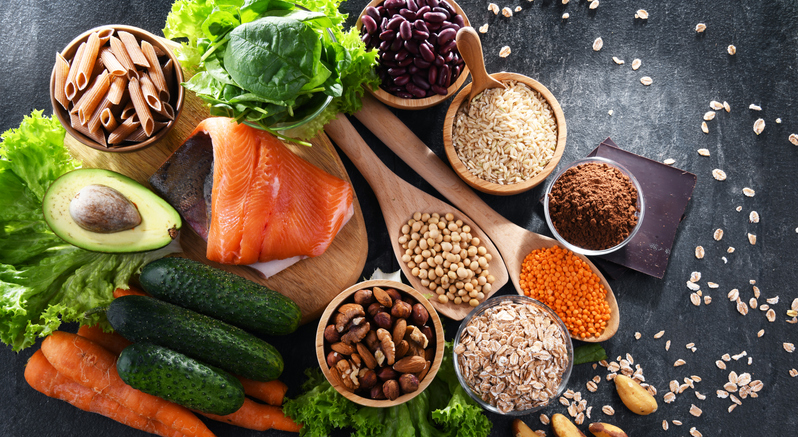Exploring the Impact of Diet on Bladder Control
Posted by Jeanne Lowry on May 17th 2024

Managing bladder control can often feel like a relentless struggle, causing both discomfort and inconvenience. However, a solution commonly overlooked is adjusting your diet. Here, we investigate how diet affects bladder control and provide useful advice for developing a bladder-friendly diet.
Can Diet Impact Bladder Control?
It is universally recognized that diet plays a major role in our general health, and this includes bladder health. Making certain dietary choices can significantly enhance bladder control and minimize bladder-related issues, such as incontinence. This article will examine how diet affects bladder control, identify foods beneficial for bladder health, and discuss the importance of hydration for optimal bladder control.
For improved bladder health, foods rich in fiber are highly beneficial. Including whole grains, fruits, vegetables, and legumes in your diet can regulate bowel movements and prevent constipation, which can exert unnecessary pressure on the bladder. In addition, certain foods such as cranberries, blueberries, broccoli, and leafy greens are loaded with antioxidants and vitamins that promote bladder health.
Besides a balanced diet, hydration plays a critical role in maintaining bladder control. Regular water intake can flush out toxins and bacteria from your urinary system, reducing the risk of infections and promoting bladder function. A general guideline is to consume at least 8 cups (64 ounces) of water daily, but remember to adjust based on your activity levels and local climate.
While diet can greatly enhance bladder control, it's always recommended to consult with a healthcare professional for personalized advice. A healthy diet is just one aspect of bladder health, so incorporating other lifestyle factors like regular exercise and stress management is equally important.
Avoiding Foods That Irritate the Bladder for Improved Bladder Control
While certain foods can improve bladder control, others can exacerbate bladder issues. Understanding how diet affects bladder control is essential to managing it effectively. We'll explore common bladder irritating foods to avoid and provide tips on managing your diet to improve bladder control.
What are Bladder Irritating Foods?
Spicy foods, caffeine-rich products, alcohol, citrus fruits, and carbonated beverages can irritate the bladder and increase the frequency of urination. If you struggle with bladder control, avoiding these foods may be beneficial.
Managing Your Diet for Better Bladder Control:
Studies show a significant link between diet and bladder control. Identifying trigger foods and making dietary modifications can reduce bladder symptoms. Here are some tips:
- Stay hydrated but avoid excessive fluid intake close to bedtime.
- Keep a food diary to identify potential bladder irritating foods.
- Incorporate bladder-friendly foods such as bananas, apples, oats, and yogurt.
- Avoid overeating as it can put pressure on the bladder.
- Consult a healthcare professional for personalized advice.
By making mindful dietary changes, you can improve bladder control.
Designing a Bladder-Friendly Diet
A bladder-friendly diet is a key element in supporting bladder control and overall urinary health. By integrating essential nutrients and balancing your diet, you can optimize your bladder health. Here are some guidelines:
Essential Nutrients for Bladder Health
Fiber, water, and probiotics are vital for bladder health. Fiber prevents constipation, water flushes out toxins, and probiotics promote a healthy gut, indirectly affecting bladder health.
How to Balance Your Diet for Bladder Control
Avoid bladder irritating foods such as caffeine, alcohol, spicy foods, and artificial sweeteners. Include a variety of fruits, vegetables, and lean proteins in your diet for a wide range of nutrients.
Meal Planning for Bladder Health
Planning your meals in advance, including a variety of foods, and controlling portion sizes can help you stick to a bladder-friendly diet.
Remember, a bladder-friendly diet is just one aspect of bladder control. Always consult with a healthcare professional for personalized advice.
Lifestyle Changes for Better Bladder Control
Bladder control is essential for a comfortable and active life. While diet plays a significant role, making certain lifestyle changes can greatly enhance bladder control. Here are three key areas to focus on:
Exercise: Regular physical activity, especially exercises targeting the pelvic floor muscles, can strengthen bladder support and improve bladder control.
Stress Management: Stress can worsen bladder control issues. Employing stress management techniques like deep breathing, meditation, or yoga can reduce stress levels and improve bladder control.
Dietary Choices: Maintaining a healthy diet, staying hydrated, avoiding excessive caffeine and alcohol, and quitting smoking can all improve bladder health.
By integrating these lifestyle changes into your routine, you can improve bladder control and overall quality of life. For additional assistance, explore the range of incontinence products available at MyCareSupplies.com.

